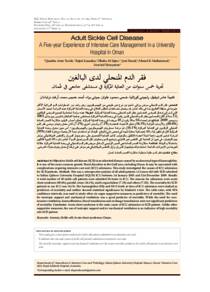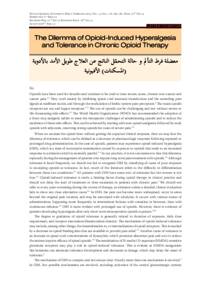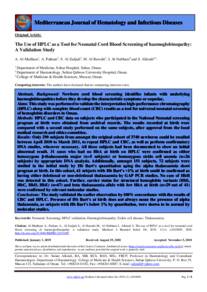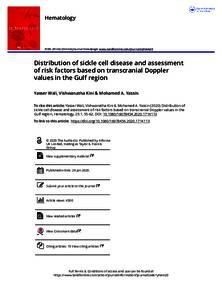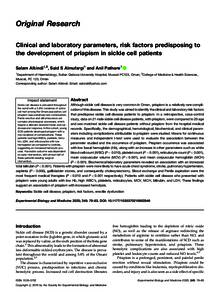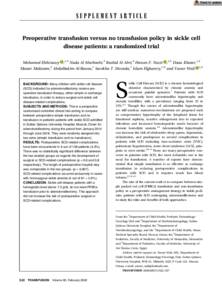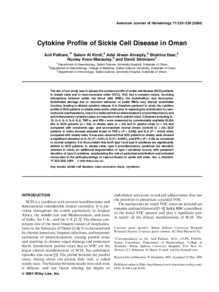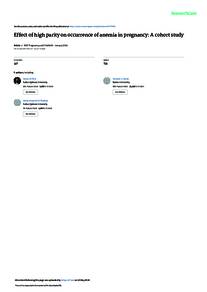Document
Adult sickle cell disease : a five-year experience of intensive care management in a university hospital in Oman.
Contributors
Other titles
فقر الدم المنجلي لدى البالغين: تجربة خمس سنوات من العناية المركزة في مستشفى جامعي في عُمان
Publisher
College of Medicine, Sultan Qaboos University.
Gregorian
2012-05
Language
English
English abstract
abstract: Objectives: Sickle cell disease (SCD) is an inherited disease caused by an abnormal type of haemoglobin.
It is one of the most common genetic blood disorders in the Gulf area, including Oman. It may be associated with
complications requiring intensive care unit (ICU) admission. This study investigated the causes of ICU admission
for SCD patients. Methods: This was a retrospective analysis of all adult patients ≥12 years old with SCD admitted
to Sultan Qaboos University Hospital (SQUH) ICU between 1st January 2005 and 31st December 2009. Results:
A total number of 49 sickle cell patients were admitted 56 times to ICU. The reasons for admission were acute
chest syndrome (69.6%), painful crises (16.1%), multi-organ failure (7.1%) and others (7.2%). The mortality for SCD
patients in our ICU was 16.1%. The haemoglobin (Hb) and Hb S levels at time of ICU admission were studied as
predictors of mortality and neither showed statistical significance by Student's t-test. The odds ratio, with 95%
confidence intervals, was used to study other six organ supportive measures as predictors of mortality. The need
for inotropic support and mechanical ventilation was a good predictor of mortality. While the need for noninvasive
ventilation, haemofiltration, blood transfusions and exchange transfusions were not significant predictors
of mortality. Conclusion: Acute chest syndrome is the main cause of ICU admission in SCD patient. Unlike other
supportive measures, the use of inotropic support and/or mechanical ventilation is an indicator of high mortality
rate SCD patient.
Member of
Resource URL
Citation
Tawfic, Qutaiba Amir, Kausalya, Rajini, Burad, Jyoti, Mohammed, Ahmed K & Narayanan, Aravind (2012). Adult Sickle Cell Disease: A Five-year Experience of Intensive Care Management in a University Hospital in Oman. Sultan Qaboos University Medical Journal,
Arabic abstract
الملخص: فقر الدم المنجلي مرض وراثي ناجم عن نوع غير طبيعي من الهيموغلوبين، وهو واحد من إضطرابات الدم الوراثية الأكثر شيوعاً في منطقة الخليج، بما في ذلك عمان. قد يحصل مضاعفات تتطلب العلاج في وحدة العناية المركزة. هذه الدراسة تبحث الأسباب التي أدت إلى إدخال المرضى المصابين بفقر الدم المنجلي وحدة العناية المركزة. الطريقة: هذه دراسة استعادية لجميع المرضى البالغين (12 سنة وأكثر) المصابين بفقر الدم المنجلي الذين رقدوا في وحدة العناية المركزة بمستشفى جامعة السلطان قابوس بين يناير 2005 وديسمبر 2009. النتائج: تم إحصاء 56 حالة رقود لـ 49 مريضاً في وحدة العناية المركزة. شملت أسباب الرقود متلازمة الصدر الحاد (69.6%)، والأزمات المؤلمة (16.1%)، فشل الأعضاء المتعددة (7.1%)، وأسباب أخرى (7.2%). كان معدل وفيات مرضى فقر الدم المنجلي الراقدين في العناية المركزة (16.1%). تم دراسة مستويات الهيموغلوبين والهيموغلوبين-أس حين دخول وحدة العناية المركزة لكن لم تظهر أية أدلة أحصائية معتدّة لهما في فحص (تي) لتوقع الوفاة. تم استخدام نسبة الأرجحية مع فترة الثقة (95%) لدراسة تدابير أخرى داعمة لستة أعضاء للتكهّن بالوفيات. كانت الحاجة للحصول على جهاز دعم الدوران والتنفس الميكانيكي مؤشر جيد للوفيات، في حين أن الحاجة إلى التنفس غير الغازي وترشيح الدم وعمليات نقل الدم وتبديل الدم لا تعتبر ذات دلاله كبيرة للتكهن باحتمالات الوفاة. الخلاصة: متلازمة الصدر الحادة هي السبب الرئيسي لإدخال مريض فقر الدم المنجلي في وحدة العناية المركزة. خلافاً لغيرها من الإجراءات الداعمة، استخدام الدعم لجهاز الدوران و\ أو التنفس الميكانيكي هو مؤشر على ارتفاع معدل وفيات هؤلاء المرضى.
Category
Journal articles

